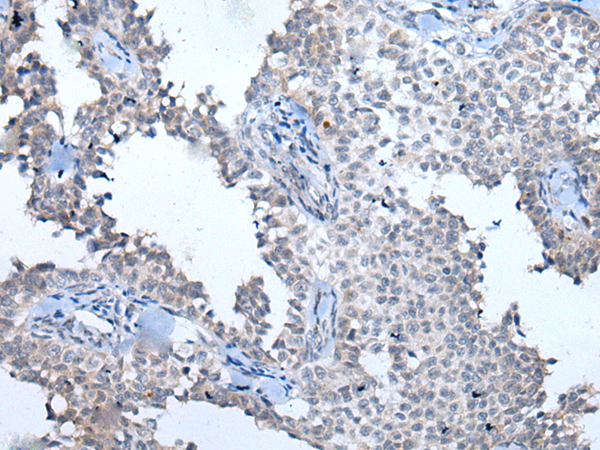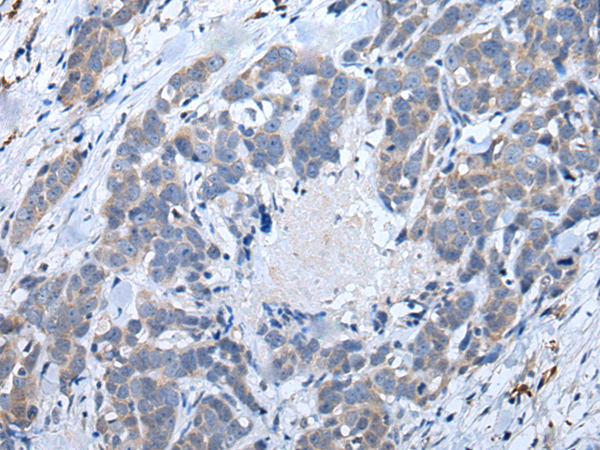

| WB | 咨询技术 | Human,Mouse,Rat |
| IF | 咨询技术 | Human,Mouse,Rat |
| IHC | 1/40-1/200 | Human,Mouse,Rat |
| ICC | 技术咨询 | Human,Mouse,Rat |
| FCM | 咨询技术 | Human,Mouse,Rat |
| Elisa | 1/5000-1/10000 | Human,Mouse,Rat |
| Aliases | AT1; ATA; ATC; ATD; ATE; ATDC; TEL1; TELO1 |
| Host/Isotype | Rabbit IgG |
| Antibody Type | Primary antibody |
| Storage | Store at 4°C short term. Aliquot and store at -20°C long term. Avoid freeze/thaw cycles. |
| Species Reactivity | Human |
| Immunogen | Synthetic peptide of human ATM |
| Formulation | Purified antibody in PBS with 0.05% sodium azide and 50% glycerol. |
+ +
以下是3篇关于ATM抗体的代表性文献摘要整理(信息基于公开研究内容归纳):
1. **文献名称**: "Autoantibodies to the ATM protein kinase in patients with systemic sclerosis"
**作者**: M. K. Crow 等
**摘要**: 该研究在系统性硬化症(硬皮病)患者血清中发现针对ATM激酶的自身抗体,提示ATM蛋白异常可能与自身免疫反应中的DNA损伤修复失调有关,为疾病机制提供了新视角。
2. **文献名称**: "ATM deficiency sensitizes mantle cell lymphoma cells to poly(ADP-ribose) polymerase-1 inhibitors"
**作者**: C. J. Lord 等
**摘要**: 探讨ATM基因缺陷的套细胞淋巴瘤细胞对PARP抑制剂敏感性增强的机制,指出ATM蛋白缺失可能导致DNA修复依赖途径改变,为靶向治疗提供依据。
3. **文献名称**: "Ataxia-telangiectasia mutated (ATM) kinase loss in breast cancer: Clinical significance and therapeutic implications"
**作者**: S. A. Martin 等
**摘要**: 分析乳腺癌中ATM蛋白表达缺失与患者预后的相关性,发现ATM缺失可能增加基因组不稳定性并影响化疗响应,提示其作为潜在生物标志物的价值。
---
**提示**:若需具体实验参考,建议通过PubMed或Web of Science以“ATM autoantibody”、“ATM deficiency”等关键词检索最新文献,并优先选择高被引或权威期刊论文(如 *Nature*、*Blood*、*Journal of Autoimmunity*)。部分研究可能侧重ATM基因突变而非抗体,需注意区分。
ATM (Ataxia-Telangiectasia Mutated) antibodies target the ATM protein, a critical serine/threonine kinase involved in DNA damage response and genomic stability. The ATM gene, mutated in the rare autosomal recessive disorder Ataxia-Telangiectasia (A-T), encodes a large protein kinase belonging to the PI3K (phosphatidylinositol 3-kinase)-related kinase family. ATM is activated primarily by double-strand DNA breaks (DSBs), triggering phosphorylation of downstream substrates like CHK2. BRCA1. and p53 to regulate cell cycle checkpoints, DNA repair, and apoptosis. Dysfunctional ATM leads to defective DSB repair, genomic instability, and increased cancer susceptibility, particularly lymphoid malignancies. A-T patients exhibit neurodegeneration, immunodeficiency, and radiation sensitivity.
ATM antibodies are essential tools in research and diagnostics. They detect ATM expression, phosphorylation status, and localization in cells, aiding studies on DNA repair mechanisms, cancer biology, and A-T pathophysiology. In clinical settings, ATM antibody-based assays help identify ATM protein loss or dysfunction, supporting A-T diagnosis or assessing cancer prognosis. Additionally, ATM-deficient tumors may predict sensitivity to PARP inhibitors or radiotherapy. Commercial antibodies vary in specificity for total ATM, activated (phosphorylated) forms, or mutant variants, requiring validation for experimental accuracy. Understanding ATM’s role and antibody applications advances targeted therapies and precision medicine for A-T and ATM-linked cancers.
×